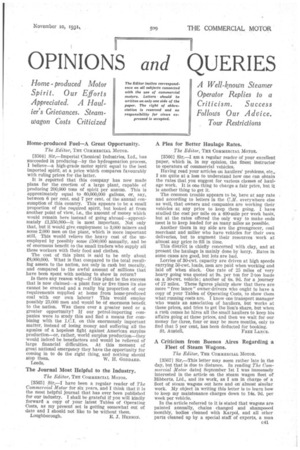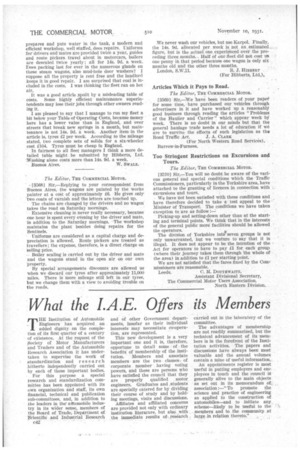OPINIONS and QUERIES
Page 63

Page 64

If you've noticed an error in this article please click here to report it so we can fix it.
Home-produced Motor Spirit. Our Efforts Appreciated. A Haulier's Grievances. Steamwagon Costs Criticized
A Well-known Steamer Operator Replies to a
Criticism. Success Follows Our Advice. Tour Restrictions
Home-produced Fuel—A Great Opportunity.
The Editor, THE COMMERCIAL MOTOR.
[3564] Sir,—Imperial Chemical Industries, Ltd., has succeeded in producing—by the hydrogenation process, I believe—a high-grade motor spirit equal to the best imported spirit, at a price which compares favourably with ruling prices for the latter.
It is reported that this company has now made plans for the erection of a large plant, capable of producing 200,000 tons of spirit per annum. This is approximately equal to 60,000,000 gallons, or, say, between 6 per cent. and 7 per cent, of the annual consumption of this. country. This appears to be a small proportion of the required spirit, but looked at from another point of view, i.e., the amount of money which would remain here instead of going abroad—approximately £1,350,000—it is most important. Not only that, but it would give employment to 3,000 miners and some 2000, men on the plant, which is more important still. This would relieve the heavy cost of the unemployed by possibly some £500,000 annually, and be of enormous benefit to the small traders who supply all these workers with their food and clothes.
The cost of this plant is said to be only about f8,000,000. What is that compared to the total resulting assets. to the nation, not only in cash but morally, and compared to the awful amount of millions that have been spent with nothing to show in return?
Is there any reason why—if this plant be the success that is now claimed—a plant four or five times its size cannot be erected and a really big proportion of our requirements supplied at home from home-produced coal with our, own labour? This would employ possibly 25,000 men and would be of enormous benefit to the nation. Was there ever a greater need or a greater opportunity? If our petrol-importing companies were to study this and find a means for combining vvith the 1.0.1. on this enormously important matter, instead of losing money and suffering all the agonies of a hopeless fight against American surplus production—or, rather, world surplus production—they would indeed be benefactors and would be relieved of large financial difficulties. At this moment of great national emergency they have the opportunity for coming in to do the right thing, and nothing should
stop them. W. H. GODDARD. Leeds.
The Journal Most Helpful to the Industry.
The Editor, THE COMPrIERCIAL MOTOR.
[3505] have been a regular reader of The Commercial Motor for six years, and I think that it is the most helpful journal that has ever been published for our industry. I shall be grateful if you will kindly forward a copy of your latest Tables of Operating Costs, as my present set is getting somewhat out of date and I should not like to be without them.
Loughborough. E. J. HENSON.
A Plea for Better Haulage Rates, The Editor, THE COMMERCIAL MOTOR.
[3566] Sir,—I am a regular reader of your excellent paper, which is, in my opinion, the finest instructor to operators of commercial vehicles. Having read your articles on hauliers' problems, etc., I am quite at a loss to understand how one can obtain the rates that you suggest for various classes of haulage work. It is one thing to charge a fair price, but it is another thing to get it.
The common trouble appears to be, here at any rate and according to letters in the C.M. everywhere else as well, that owners and companies are working their vehicles at any price to keep them going. I have studied the cost per mile on a 400-mile per week basis, but at the rates offered the only way to make ends meet is to keep loaded for as many miles as possible.
Another thorn in my side are the greengrocer, coal merchant and miller who have vehicles for their own deliveries, but to augment their resources work at almost any p_rice to fill in time. This district is chiefly concerned with clay, and at present the haulage is mainly done by lorry. Rates in some eases are good, but lots are bad.
Lorries of 30-cwt. capacity are driven at high speeds carrying 50-cwt. loads, men are paid when working and laid off when slack. One rate of 25 miles of very heavy going was quoted at 9s. per ton for 2-ton loads on a 30-cwt. vehicle ; another of (is. 9d. for a journey of 27 miles. These figures plainly show that there are more "free lance" owner-drivers who ought to have a copy of your Tables of Operating Costs, to show them what running costs are. I know one transport manager who wants an association of hauliers, but works at these prices, and tries to get the lion's share, but when a rush comes he hires all the small hauliers to keep his affairs going at these prices, and then we wait for our money for.three, four or may be more months, only to find that 5 per cent. has been deducted for booking.
St. Austell. FREE LANCE.
A Criticism from Buenos Aires Regarding a Fleet of Steam Wagons.
The Editor, ME COMMERCIAL MOTOR.
[8567] Sir,—This letter may seem rather late in the day, but that is due to distance. In reading 7'h-e Commercial Motor dated September 1st I was immensely interested in the article on the steam wagon fleet of Hibberts, Ltd., and its work, as I am in charge of a fleet of steam wagons out here and on almost similar work. My object in writing this letter is to learn how to keep my maintenance charges down to 14s. 9d. per week per vehicle.
In the article referred to it is stated that wagons are painted annually, chains changed and shampooed monthly, bodies cleaned with Karpol, and all other parts cleaned up by a special staff of experts, a man prepares and puts water in the tank, a modern and efficient workshop, well staffed, does repairs. Uniforms for drivers and mates are provided twice a year, guides and route pickers travel about in motorcars, boilers are descaled twice yearly ; all for 14s. 9d. a week. Does packing last for ever in the numerous glands on these steam wagons, also mud-hole door washers? I suppose all the property is rent free and the landlord keeps it in good repair. I am surprised that coal is included in the costs. I was thinking the fleet ran on hot air.
It was a good article spoilt by a misleading table of costs. Some highly efficient maintenance superintendents may lose their jobs through other owners reading it.
I am pleased to say that I manage to run my fleet a bit below your Table of Operating Costs, because money here has a lower value than in England, and over streets that break new springs in a month, but maintenance is not 14s. 9d. a week. Another item in the article is, tyres £2 per week. According to the mileage stated, two complete sets of solids for a six-wheeler cost £104. Tyres must be cheap in England.
In fairness to all fleet managers I think a more detailed table might be submitted by Hibberts, Ltd. -Washing alone costs more than 14s. 9d. a week.
Buenos Aires. W. SWALE.
The Editor, THE COMMERCIAL MOTOR.
-135681 Sir,—Replying to your correspondent from Buenos Aires, the wagons are painted by the works painter at a cost of approximately £6. He gives only
'two coats of varnish and the letters are touched up.
The chains are changed by the drivers and no wagon. takes the road on Saturday mornings.
Extensive cleaning is never really necessary, because one hour is spent every evening by the driver and mate, in addition to the Saturday mornings. The workshop maintains the plant besides doing repairs for the Sentinels.
Uniforms are considered as a capital charge and depreciation is allowed. Route pickers are treated as travellers; the expense, therefore, is a direct charge on selling price.
• Boiler scaling is carried out by the driver and mate and the wagons stand in the open air on our own property.
By special arrangements discounts are allowed us when we discard our tyres after approximately 11,000 miles. There is more mileage still left in our tyres, but we change them with a view to avoiding trouble on the roads.
We never wash our vehicles, but use Karpol. Finally, the 14s. 9d. allocated per week is not an estimated•figure, but is the actual one experienced over the pre
ceding three months._ Half of Jour-fleet did not cost nu one penny in that period because one wagon is only six months old and the other three months.
London, S.W.11. It. J. HIBBERT (For Hibberts,
Articles Which it Pays to Read.
The Editor, THE COMMERCIAL MOTOR.
[3569] Sir,—We have been readers of your pap0 for some time, have purchased our vehicles through advertisers in it and have worked up a reasonably good business through reading the articles "Problems of the Haulier and Carrier" which appear week by week. There is no doubt in our minds but that the general haulage trade needs a lot of education if we are to survive the effects of such legislation as the
Road Traffic Act. J. A. CLARK (For North Western Road Services). Barrow-in-Furness.
Too Stringent Restrictions on Excursions and Tours.
• The Editor, THE COMMERCIAL MOTOR.
[3570] Sir,—You will no doubt be aware of the various general and special conditions which the Traffic Commissioners, particularly in the Yorkshire area, have attached to the granting of licences in connection with excursions and tours.
• VVe have not been satisfied with these conditions and have therefore decided to take a test appeal to the Minister of Transport. The conditions we have taken exception to are as follow Picking-up and setting-down other than at the starting and terminal points. We think that in the interests of the general public more facilities should be allowed ' the operators.
The division of Yorkshire into seven groups is not only unwarranted, but we venture to say that it is illegal. It does not appear to be the intention of the Act for operators to have to pay £1 for each group (where their journey takes them through the whole of the area) in addition to £1 per starting point.
We are not satisfied that the fares fixed by the Commissioners are reasonable.
Leeds. C. M. DOUTHWAITE, Assistant Divisional Secretary, The Commercial Motor Users Association, North Eastern Division.
















































































































































